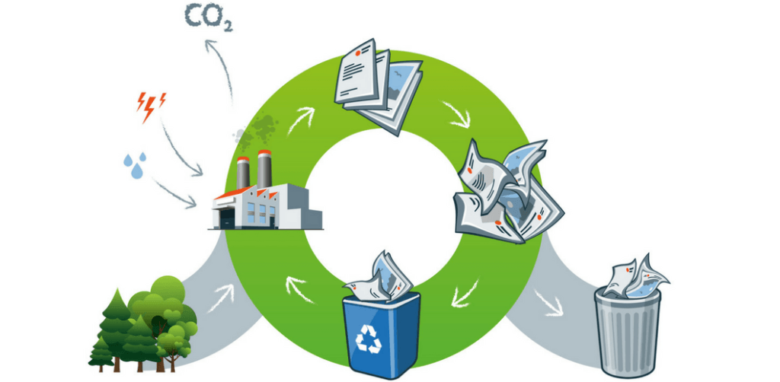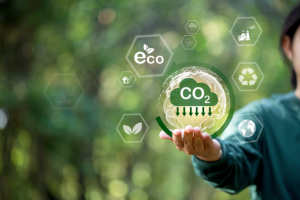In today’s increasingly environmentally conscious era, the importance of sustainable recycling methods cannot be overstated. Waste processing is a growing problem worldwide. New ideas are being developed to create recycling loops and make the future more sustainable and environmentally friendly.
The Problem at Hand
Waste has become a major problem around the world, with overflowing landfills and polluted oceans. Traditional recycling methods are not always effective because they cannot handle the amount and type of materials recycled. This is where eco-friendly recycling technology comes in.
New Sorting Technology
Proper sorting is a crucial part of closing the recycling cycle. Artificial intelligence (AI) and robotics are two examples of new technologies that are changing the way we categorize things. These technologies increase accuracy and speed, ensuring materials are correctly identified and sent to the correct recycling stream.
Chemical Recycling
Chemical recycling is a major step forward from older recycling methods, which often result in a loss of quality and efficiency. This new method breaks down plastic into its chemical components, creating high-quality recycled materials. Chemical recycling changes everything. It solves the problem of mechanical recycling and makes way for a more connected economy.
Internet of Things (IoT) and Smart Waste Bins
The Internet of Things (IoT) has entered the recycling space with the rise of smart waste bins. These bins use technology to track and improve waste collection, saving time and money and being better for the environment. The integration of IoT also enables real-time data collection, allowing organizations and cities to make informed choices about how they manage waste.
Stop E-waste
In our technology-driven world, electronic waste (e-waste) is becoming an increasing problem. Sustainable recycling technologies are making progress in closing the e-waste loop by diverting useful materials from old electronics. This not only reduces damage to the planet but also helps keep valuable resources safe.
Sustainable Recycling Helps the Economy
Sustainable recycling technology is not only good for the planet but also makes a strong business case. The recycling industry is quickly becoming a place where new jobs, ideas, and investments can be found. Companies and governments realize that environmental protection can improve their profits. This makes recycling technology even more popular.
Education and Community Involvement
While new technologies are important, education and community involvement are even more important for sustainable recycling technologies to work. Raising awareness about the importance of recycling and how new technologies are changing things can help create a culture of responsible waste management and consumption.
Recycling programs can get more people involved in the community through educational workshops, awareness campaigns, and incentive programs. It makes a big difference if everyone knows how important their role is in recycling in a way that doesn’t harm the environment.
Responsible for the Company
Companies play an important role in getting people to use sustainable recycling technologies. Responsible business is not just about making money; it’s also about taking care of the world. Green practices, eco-friendly packaging, and investing in long-term supply lines are all things companies can do.
Furthermore, collaborating with a company that produces recycling technology provides benefits for both parties. These partnerships not only make the company look greener but also help improve recycling technology through research and development.
Government Program
Governments have a lot of power when it comes to waste processing. Policies that reward environmentally friendly behavior and punish environmentally harmful behavior facilitate the widespread adoption of recycling technologies.
By providing financial incentives, tax breaks, and clear regulations, companies and individuals can be encouraged to invest in and use sustainable recycling methods. Government funding for research and development can help generate new ideas in the recycling technology sector.
Global Cooperation
Waste knows no borders, and solving the global problem of waste management requires people from all over the world to work together. Sharing the best recycling methods, research results and technologies across borders can accelerate progress toward making recycling more sustainable worldwide.
International groups, governments, and the private sector can work together to make recycling and waste management more consistent. This not only makes it easier for people to share their knowledge, it also ensures that everyone in the world can benefit from improvements in sustainable recycling.
The Road Ahead
Closing the loop in sustainable recycling is everyone’s job: individuals, companies, governments, and the world. Embracing new technologies is just one part of a multifaceted plan for a healthy future.
As we move forward, it’s important to remember that the path to healthy recycling continues. For this process to remain transformative, research, investment, and a commitment to change are necessary. We can make the world a better place by working together to reduce waste, conserve resources, and keep the cycle of sustainability going.
Conclusion
Finally, environmentally friendly disposal methods herald a new era of waste disposal. These new ideas, such as smarter ways to sort items, recycle chemicals, and connect the Internet of Things (IoT), close the loop on the old direct economy. Supporting and embracing these technologies is not only the right thing to do for the planet, it’s also a smart step towards a more sustainable and profitable future. As we tackle our waste management challenges, sustainable recycling technologies are a beacon of light leading the way to a cleaner, healthier world.
FAQs
1. What does “sustainable recycling technology” mean?
Sustainable recycling technology is a new way of doing things that aim to make recycling more efficient and environmentally friendly. These technologies aim to solve current waste management problems and make the way things are disposed of more environmentally friendly.
2. How can artificial intelligence make recycling more environmentally friendly?
Artificial intelligence (AI) is an important part of sustainable recycling because it enables better sorting. AI-powered systems can quickly and correctly identify and sort materials, improving recycling efficiency and preventing contamination of recycled materials.
3. Tell me about chemical recycling. How does this differ from mechanical recycling?
Chemical recycling creates high-quality recycled materials by breaking down substances into their molecular parts. Mechanical recycling, on the other hand, often involves melting or crushing objects, which can compromise their quality.
4. What is a smart trash can? How do they ensure that waste lasts longer?
Smart bins are bins with built-in Internet of Things (IoT) technology. These bins are equipped with sensors that can monitor the amount of waste inside, find the best way to collect it, and provide real-time information for better waste management. Use the Internet of Things to improve your entire recycling system.
5. How does environmentally friendly recycling technology deal with electronic waste (e-waste)?
E-waste can be addressed by using sustainable recycling techniques to obtain useful materials from old electronics. By reusing materials in electronics, these technologies help protect the planet and support a circular economy.
6. What role do groups play in sustainable recycling?
Communities are important to the success of sustainable recycling. Active community engagement, education, and awareness campaigns encourage people to dispose of waste responsibly, making recycling programs more effective overall.



